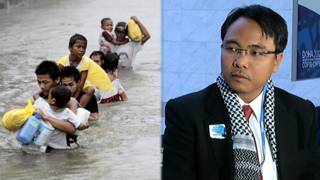
In a rare media appearance at the U.N. climate talks in Doha, U.S. climate negotiator Jonathan Pershing is questioned by Democracy Now! host Amy Goodman about the United States’ failure to do more to cut emissions and to save the planet from catastrophic climate change. Meanwhile, U.S. climate envoy Todd Stern has held just one press conference here in Doha. He was scheduled to hold another one today, but if you look at today’s conference list online, the event is the only one marked in red: The press conference was canceled. [includes rush transcript]
Transcript
AMY GOODMAN: High-level talks are continuing here at the United Nations climate summit in Doha, Qatar. Just before we went to air, a coalition of groups held an action to stand in solidarity with the Philippines following yesterday’s devastating typhoon that killed at least 270 people. For years, scientists have warned climate change will cause stronger typhoons in the region. On Tuesday, U.N. Secretary-General Ban Ki-moon warned extreme weather is the “new normal.”
SECRETARY-GENERAL BAN KI-MOON: Danger signs are all around. One-third of the world’s population lives in countries with moderate to high water stress. Land degradation affects 1.5 billion people. Ice caps are showing unprecedented melting. Permafrost is thawing. Sea levels are rising. The abnormal is the now new normal.
AMY GOODMAN: A new report out today by the World Bank warns disasters related to global warming have cost Arab nations $12 billion in the past 30 years and will increase greatly in coming decades. The World Bank says some cities in the Arab world could become unlivable by the end of the century.
Here at the climate talks in Doha, developing nations are accusing the United States and other wealthy nations of not pledging to cut greenhouse gas emissions enough and failing to pay poorer nations for loss and damage from weather events caused by climate change.
Chee Yoke Ling is director of the Third World Network.
CHEE YOKE LING: We have seen the developed countries not doing what they should do. The pledges—or rather, the commitments that they have put on the table, the developed countries, that are going to cut emissions of greenhouse gases under the Kyoto Protocol, is very, very low. Very important countries like the United States are not a party to the Kyoto Protocol. But worse, we have more and more countries which are leaving the Kyoto Protocol second commitment period.
AMY GOODMAN: Earlier today, I had a chance to question U.S. chief climate negotiator Jonathan Pershing.
AMY GOODMAN: Amy Goodman, Democracy Now! Civil society groups are extremely frustrated here. President Obama, in his first speech after he was elected, said that he didn’t want his—he didn’t want our children to live in an America that isn’t threatened by the destructive power of a warming planet. Yesterday, a number of civil society groups held a news conference, and they said at that news conference—Kumi Naidoo of Greenpeace International said, “Todd Stern and Jonathan Pershing have come to Doha with their needles stuck in the groove of obstructing the U.N. process, an art they have perfected.” And he said that it is “disrespectful of President Obama to inflict on us two negative negotiators who act as if the comments he made after his election were never made. Obama should pick up the phone and tell his delegates to follow his lead, or, alternatively, call them back to Washington.” That’s what Kumi Naidoo said. Jonathan Pershing, are you following President Obama’s wishes? And how do you respond to civil society groups who are saying that the U.S. is the lead obstructor to any kind of negotiated deal here in Doha?
JONATHAN PERSHING: I have no comment on the first part of that. On the second piece, I think the United States’s role is very much one of engaging actively and constructively in the discussion. We are one of the significant contributors to the intellectual thinking in the process. We have been. We will continue to try to do that. It doesn’t mean that we will agree with everyone on everything. This is, after all, a negotiation. We’re looking to participate in an outcome that will lead to a reduction in global greenhouse gas emissions. We’re looking at an outcome that will be acceptable to all parties. We’re looking at an outcome that will be effective in the time frame that we’ve set for ourselves to move forward.
RONALD JUMEAU: Yeah, I just want to make a comment. The world that President Obama doesn’t want American children to live in is already here, and it’s only going to get worse. I guess the most frustrated people on earth now must be scientists. There’s all this talk about, all this waffle about, “We have to do things according to the science,” and everybody seems to—while the talks may be moving at a snail’s pace—as I said, the Doha caravan is lost in a sandstorm—everybody seems to be breaking their neck to get as far from the science as possible. So, the world is already here. And whether the U.S. or any other country, including my own, fears their children living in it, they are living in it. And I would hope maybe their kids should turn around and tell their parents, “Dad, haven’t you noticed? We’re already there.”
AMY GOODMAN: That was Ronald Jumeau, Seychelles ambassador for climate change, Seychelles in the Pacific off the eastern coast of Africa. Before that, you heard Jonathan Pershing, the U.S. chief climate negotiator, in a rare appearance before the media. So far, U.S. climate envoy Todd Stern has held just one news conference here in Doha after more than a week and a half. He was scheduled to hold another one today, but if you look at today’s list of meetings online, the event is the only one marked in red: The press conference was canceled.













Media Options